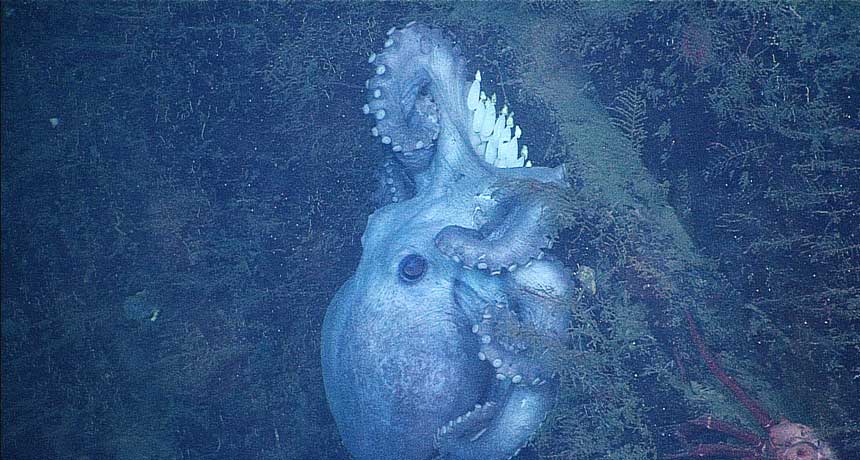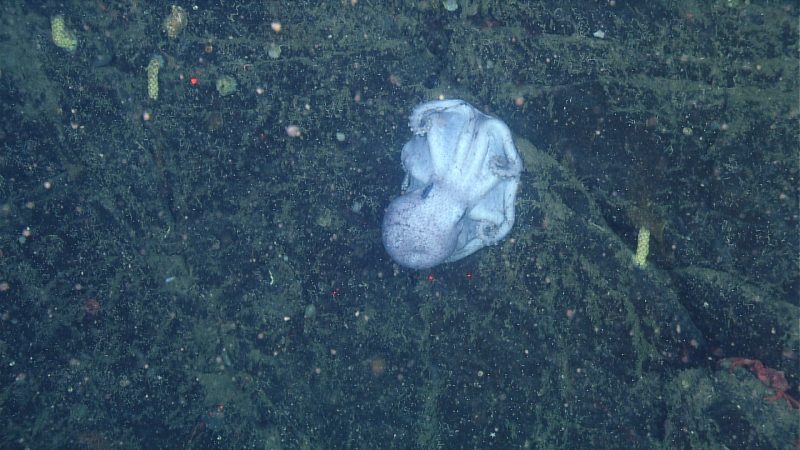Octopus sets egg-nurturing record
Lovingly dubbed ‘Octomom,’ this octopus spent almost 4.5 years protecting a clutch of eggs

This deep-sea octopus, dubbed ‘Octomom,’ remained with her eggs for more than four years as they developed.
© 2007 MBARI
This mom takes motherly dedication to a whole new level: A deep-sea octopus sat with her eggs — protecting them until hatching — for nearly four-and-a-half years. The feat sets a new world record for the longest egg-brooding period in any animal.
Scientists stumbled upon this picture of devotion by accident. “We were doing research on animals in the water column, and one day we had a little bit of extra time,” recalls Bruce Robison. He’s a deep sea biologist at the Monterey Bay Aquarium Research Institute in Moss Landing, Calif. “We decided to dive down and see what was on the bottom.”
They sent a remotely operated vehicle, or ROV, to the seafloor of Monterey Canyon. At 1,397 meters (4,583 feet, or more than eight-tenths of a mile) down, it’s “as deep as the Grand Canyon in Arizona,” Robison says. “But it’s filled with water, so few people know that it’s there.”
A female octopus typically lays just one clutch of eggs in her life. Most of the moms then rest atop those eggs like a mother hen (except octopuses do it on a rock or in a den). Scientists refer to this egg-sitting behavior as brooding.

The octopus hovers over her eggs, waving her tentacles to brush away predators. This also helps keep clean water flowing over her egg-bound brood as they grow. But there’s a downside to this devotion. Those yummy eggs are so enticing to predators that mom cannot afford to leave them alone. And that means she may never eat again.
Not surprisingly, a brooding octopus will weaken as her eggs mature. When they are finally ready to hatch, her work is done. And so is her life. At this point, the mother dies.
Scientists usually study egg-brooding only in octopus species that live in shallow water. Finding a brooding deep-sea octopus was a rare treat. Robison’s team spotted the animal on the ROV’s first dive to the bottom in May 2007. Their video showed an octopus belonging to the species Graneledone boreopacifica making its way toward a rock.
When the ROV returned a month later, the animal was still there. And the scientists knew it was the same individual. “We saw some scars on her arms that matched the [earlier] video,” he explains. But now she was settled over a clutch of eggs. This meant she “had just begun to brood,” Robison says. The scientists decided to regularly check up on the animal, which they lovingly dubbed ‘Octomom.’
They had expected her eggs might hatch in a few months. The previous octopus brooding record — 14 months — was in Bathypolypus arcticus, another deep-sea octopus. Yet as the months and years passed, the ROV’s cameras confirmed Octomom continued to protect her eggs. The researchers observed her in the same spot during 18 separate dives.
Along the way, the scientists used a laser to scan the eggs. This showed that the baby octopuses inside them were growing steadily, safe in their mother’s care. As the months and years passed, though, their mom “got pretty bedraggled,” Robison says. The formerly purple and bluish beauty turned pale. Her once-clear eyes became cloudy. But every time a potential predator approached, “she was on the job. She’d push them away,” Robison recalls.
|
This video tells the story of the deep-sea octopus that scientists observed brooding her eggs for almost 4.5 years. MBARI/Youtube |
September 2011 was the last time the scientists spotted the intrepid octopus, still watching over her eggs. One month later, mom and her hatchlings had vanished. Only the soft, torn egg casings remained. For 53 months this octopus had kept watch over a brood of between 155 and 165 eggs!
“We were relieved for her,” says Robison. “We thought, ‘Finally, her ordeal is over.’ But at the same time, it’s sad not to see her again.”
Until Octomom, a salamander held the longest-known brooding record. One had spent 48 months pregnant. Robison’s team published its findings July 30 in PLOS ONE.
The extreme cold in the deep ocean may be why Octomom’s eggs took so long to mature and hatch. The water is only about 3° Celsius (37.4° Fahrenheit). The frigid temperature also may have slowed the mother’s metabolism, helping her survive so long without food.
“It’s an extraordinarily long brooding period. There might be longer brooding periods out there, but I think the prime candidate for beating this record is another octopus species,” says Louise Allcock. She’s a zoologist at the National University of Ireland in Galway. The good news: There are now many ROVs, submersibles and other systems available to probe the deep ocean. And these, she says, “are how we will discover more.”
Power Words
biology The study of living things. The scientists who study them are known as biologists.
brood A group of related animals that emerges in a specific region in the same year. Depending on the animal type, the collective group is sometimes also known as a year class.
brooding period The time a parent spends with a clutch of eggs or young, assisting in their development and protecting them from predators.
deep-sea octopus (Graneledone boreopacifica). An octopus in the family Octopodidae. It lives in both the Atlantic and Pacific in the deep ocean.
metabolism The set of life-sustaining chemical reactions that take place inside cells. These reactions enable organisms to grow, reproduce, move and otherwise respond to their environments.
octopus Sea mollusks with a soft, sac-shaped body and eight tentacles. Two rows of suckers along each tentacle give the animal an ability to grasp and hold onto things. Cousins of the squids, these animals have a sharp beak-like mouth and good vision.
remotely operated underwater vehicle (or ROV) An electrically powered craft that is tethered to something above the water, usually a ship. People operate this craft from a remote location. Because these vehicles don’t need a pilot onboard, then can go places that are inhospitable for people, such as the very deep ocean.
zoology The study of animals and their habitats. Scientists who undertake this work are known as zoologists.







